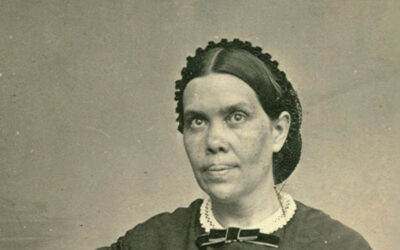When it comes to lifelong struggles with health, Ellen White was no stranger. In fact, health challenges set the tone for her life early on—years before she was involved in co-founding the Seventh-day Adventist Church.
She was born healthy in 1827 into a family of eight children. But an accident in her early years changed everything.
For most of her life, she had to cope with pain, illness, and discouragement. But she also learned to put complete trust in God, which opened the doors to amazing opportunities. God used Ellen White in extraordinary ways.
Here’s the story of how she became a strong, capable woman by following the Holy Spirit’s lead and making important decisions about how she treated her mind and body.
We’ll cover:
- The beginning of Ellen White’s health challenges
- Navigating these health challenges as she grew and matured
- How she overcame many health-related limitations
- Amazing things we can learn from her experience
Let’s start with the day Ellen White’s life changed dramatically.
The beginning of Ellen White’s health challenges

Photo by petr sidorov on Unsplash
The story of Ellen (Harmon) White’s struggles with pain and illness began when she was only nine years old. One day, as she was walking with her twin sister and a classmate, another older classmate angrily threw a stone that hit her square in the face. She collapsed and lay unconscious for three weeks.1
Even after she regained consciousness, she remained weak and in pain because of the injury to her nose and face. No one thought she would live long.
A couple years passed before she attempted school again. While her mind could still learn and think critically, her body couldn’t keep up. She would grow tired very quickly, and dealt with symptoms most kids her age wouldn’t be familiar with at all.
“As I endeavored to bend my mind to my studies, the letters in the page would run together, great drops of perspiration would stand upon my brow, and a faintness and dizziness would seize me. I had a bad cough, and my whole system seemed debilitated.”2
Her nervous system was “prostrated,” she wrote.3
A few years later, she tried school again, but her health failed her yet again. She was forced to permanently end her schooling.4
And not only did her classwork stop, but most typical childhood activities did as well. She remained disabled throughout her childhood.
Upon later reflection, however, she actually said that this dark cloud of infirmity had a silver lining.
“The affliction that had darkened my childhood seemed to have been dealt me in mercy, for my good, to turn my heart away from the world and its unsatisfying pleasures, and incline it toward the enduring attractions of heaven.”5
Her seclusion away from school and friends led her to a deep study of God and His Word—the Bible. She was baptized into the Methodist Church at the age of 12, and as a teenager, she joined the Millerite movement.
And this movement paved the way for the beginning of the Seventh-day Adventist Church. She became involved in ministry when she was 17 years old.
Because of this deep desire to know more about God, He worked through her to do incredible things.
Navigating health challenges over the years

Photo by Hush Naidoo Jade Photography on Unsplash
The health issues that resulted from her childhood accident stayed with her for much of her life. She dealt with chronic illness and consistent pain. But because of her growing faith, she didn’t give in to despair—even though there were several times she felt like everything was impossible.
Her injured nasal area continued to bother her for much of her life. She suffered from general weakness and other strange, nagging side-effects, describing herself as “weak and feeble, subject to frequent fainting spells.”6 While speaking in 1869, she noted “having had five shocks of paralysis. I have been with my left arm bound to my side for months, because the pain in my heart was so great.”7
Imagine trying to work with such a defeating condition!
And yet she felt a great responsibility in her life, wanting to do good for others and share the Gospel. She never quit.
But her determination would sometimes push her too far, and she’d overwork herself.
“When writing ‘Spiritual Gifts,’ Volumes III and IV [1863-64], I would become exhausted by excessive labor. I then saw that I must change my course of life, and by resting a few days I came out all right again.”8
Proper rest became an important theme in her life. Because without enough of it, she simply couldn’t function.
When she’d overdo things, she would become so weak that she couldn’t even hold her children without fainting.
And besides her writing and duties at home, she and her husband, James White, traveled often, which contributed to their exhaustion.
James was also sick with various ailments from time to time, leaving Ellen to tend to him—all on top of caring for her young children, her church and ministry activities, and maintaining her household. At one point, things got so bad that they had to go to a sanitarium, or health and wellness clinic, in New York.
However, most of what Ellen White is known for has nothing to do with her health setbacks. She lived a long life of 87 years and was very active.
So how was she able to get past these health issues?
How she overcame her health-related limitations
Ellen White conquered her illness through a number of lifestyle changes, and she attributes this wisdom to the guidance of the Holy Spirit. In her own life, and in the lives of those she counseled, she witnessed the connection between these aspects of healthful living and improved well-being. Many of these insights even came through visions she received from God’s Holy Spirit.
Physical health

Photo by Shannon Nickerson on Unsplash
In 1863, Ellen White received a vision from God that has been referred to as the “health reform” vision. In it, she saw many common foods or substances of her time that were to be avoided or used in moderation because of their harmful effects on the human body. These included meat, sugar, and various stimulants.
And with the limited medical and wellness knowledge in her time, around the years following the US’s Industrial Revolution, this information was surprising. In fact, much of it was exactly the opposite of what she—and many others—had always thought.
“Over thirty years ago I was often in great weakness,” she wrote in a letter. “…It was thought that flesh meat would give me vitality, and this was, therefore, my principal article of diet. But instead of gaining strength, I grew weaker and weaker. I often fainted from exhaustion.”9
God showed her that instead of more meat, she should greatly decrease her portions of it. And she should be adding fruit, vegetables, legumes, and other whole, unprocessed foods to her diet.
Diet was a primary part of the health reform efforts she was involved in, but it connected with many other things, like Christian temperance (or the principle of moderation), proper rest, personal hygiene, physical activity, and faith in God.
Many of these subjects were based on biblical principles. They outlined God’s original plan for humans that they would have followed in the Garden of Eden.
Ellen White immediately began incorporating these principles God showed her into her life as much as she could. When she did, she began to feel stronger and more clear-minded.
After a year of making changes to her lifestyle, she wrote, “[M]y health has never been better than for the past six months. My former faint and dizzy feelings have left me. … It is seldom I have a faint feeling. My appetite is satisfied. My food is eaten with a greater relish than ever before.”10
By focusing on whole, plant-based food options, she found that she felt better overall.
Spiritual Health

Photo by Sixteen Miles Out on Unsplash
Through her health challenges, Ellen White learned to depend on God more and strengthened her faith. She prayed and read the Bible, consistently asking for guidance and wisdom.
She encouraged other church members who had the means to change their lifestyles as well. She wrote many articles in the Adventist publication her husband regularly edited, The Review and Herald.
And in her book Testimonies for the Church, Volume 2, she wrote, “When making these changes in my diet, I refused to yield to taste, and let that govern me. Shall that stand in the way of my securing greater strength, that I may therewith glorify my Lord? Shall that stand in my way for a moment? Never!”11
By reading Scripture and communicating with God, she had the strength to push away temptation.
But she also acknowledged that change was difficult. She depended on frequent prayer and self-discipline. And sometimes she’d still have occasional moments of weakened willpower, just like any of us. But the most important part about her health journey—she did not give up.
“…I resolved with the help of God to overcome this appetite. I fought the temptation, determined not to be mastered by this habit. For weeks I was very sick; but I kept saying over and over, The Lord knows all about it. If I die, I die; but I will not yield to this desire. The struggle continued, and I was sorely afflicted for many weeks.”12
In this passage, she was referring to a specific food, instead of her whole diet. Sometimes, she determined to cut a specific food out of her diet that was a significant temptation, or that her body did not react well to. But it was rarely easy for her.
While she was making these lifestyle alterations, she prayed often for mental strength and courage. In a letter about making positive lifestyle changes, she wrote, “Ask for the prayers of those who can comprehend your need of help.”13
With God’s help, Ellen White was able to strengthen her self-control, overcoming the temptations of unhealthy foods and opting for a simple, nourishing diet.
And over time, her health improved. It didn’t occur the moment she switched her diet. She persevered, also nurturing her faith in God along the way, which helped give her strength to keep improving.
When she was sick for so long, even after cutting out certain foods, she probably questioned if it was a good idea. But she chose to trust that God would work it out, and in time, He did. Even after she regained her full health, she still was not exempt from health challenges in her later years. She, like everyone else, sometimes caught illnesses and had other difficulties, despite her healthy diet.
But in her later years, she was stronger and healthier than she was as a young woman, enabling her to travel more and stay active in ministry, in addition to caring for her household.
What we can learn from her experience

Photo by Artem Kovalev on Unsplash
There are many things we can glean from Ellen White’s health journey. Here are three big takeaways:
- Dependence on God. Health challenges can be bothersome, inconvenient, and even terrifying. It affects all sides of our lives and can be ongoing. But no matter how hard it is or how discouraged we get, let’s not lose sight of God. In Spirit of Prophecy, vol. 3, Ellen White wrote, “Christ is a ‘tried stone,’ and never disappoints those who trust in Him.”14 So whether we’re just wanting to decrease our sugar intake or we’re fighting an aggressive cancer, nothing is too big or too small for God to help us with. We can always pray for His strength and guidance.
- Overworking ourselves can be a silent killer. Many people have tried pushing the limits of their minds and bodies for various reasons, and then discovered that the body can only sustain that heightened level of activity for a limited time. Ellen White saw this firsthand, leading her to write, “It is not wise to be always under the strain of work and excitement, even in ministering to men’s spiritual needs; for in this way personal piety is neglected, and the powers of mind and soul and body are overtaxed.”15 It’s easy to get too busy with all the things demanded of us today. But you don’t have to feel guilty for taking a break every now and then. Your body and mind need it.
- There can be big power in small lifestyle changes. Sometimes, even the smallest or simplest things can hold us back from better health. Looking back later in life, Ellen White wrote, “I accepted the light on health reform as it came to me. It has been a great blessing to me. I have better health today, notwithstanding I am seventy-six years old, than I had in my younger days.”16 When she made a progression of simple changes, her health improved remarkably.
Ellen White’s journey to better health was long and tiring. Her struggles with illness sapped much of her energy during the years she needed it most.
But she didn’t let it stop her from working to bring the Word of God to the world around her. She didn’t let the difficult times squash her faith in Jesus Christ. She was patient, and God showed her ways to improve her health.
Jesus will do the same for us. Even if our health challenges seem overwhelming, we can trust in God and pray for help. He will always answer us and guide us.
If you’d like to learn more about Ellen White’s ministry,
Related Articles
- White, Arthur L., “Ellen G. White—A Brief Biography,” [↵]
- White, Ellen G., Life Sketches of Ellen G. White, p. 19. [↵]
- White, Ellen G., Christian Experience and Teachings of Ellen G. White, p. 15. [↵]
- Life Sketches of Ellen G. White, p. 26. [↵]
- Ibid., p. 25. [↵]
- White, Ellen G., Be Like Jesus, p. 316. [↵]
- White, Ellen G., Testimonies For the Church, Vol. 2, p. 371. [↵]
- Ibid., p. 372. [↵]
- White, Ellen G., Letter 83, 1901. [↵]
- White, Ellen G., Spiritual Gifts 4a, p. 153. [↵]
- Testimonies For the Church, Vol. 2, p. 372. [↵]
- White, Ellen G., “Letter 70, 1911.” [↵]
- Ibid. [↵]
- White, Ellen G., Spirit of Prophecy, Vol. 3, p. 38. [↵]
- White Ellen G., Gospel Workers, 1915 Edition, p. 243. [↵]
- White, Ellen G., Counsels of Diet and Foods, p. 482 [↵]
More Answers
How Ellen White’s Teachings Can Improve Your Health
Healthcare in the nineteenth century was said to leave “more disease than it took away” with its use of bloodletting and “medicines” like mercury and arsenic. As people questioned these methods, new approaches popped up. But which ones were reliable?
Do Adventists Worship Ellen White?
Ellen White was a co-founder and leader in the Seventh-day Adventist Church from its beginning. Adventists believe that she had the prophetic gift (Ephesians 4:14; 1 Corinthians 12:28) and passes the biblical tests of a prophet.
Can I Be an Adventist If I Don’t Believe in Ellen White?
Ellen White is an important part of the Seventh-day Adventist Church: she played a significant role in its founding, provided biblical support for several key doctrines, and continues to inspire church members today with her insightful counsel.
Ellen White and the Sabbath
The Sabbath is an important topic in the Seventh-day Adventist Church. It shouldn’t surprise you, then, that Ellen G. White, a co-founder of the church, studied the Bible’s teachings on the Sabbath and wrote large amounts about it.
Ellen White and the Great Controversy
The Great Controversy is a book written by Ellen G. White, a co-founder of the Seventh-day Adventist Church. Written in the late 1800s, the book is the last in a series and describes the connection between Bible prophecy and post-biblical history. It also discusses factors that will characterize last-day events.
Ellen White’s Visions and Prophecies
The New Testament upholds prophecy as a spiritual gift that will continue to the end of time (Ephesians 4:11–14). Seventh-day Adventists believe that Ellen G. White (1827–1915), a humble woman of God and an earnest student of the Bible, demonstrated this gift of the Holy Spirit through visions and prophecies that she received.
How Did Ellen G. White Help Found the Adventist Church?
Ellen G. White, a humble woman from Gorham, Maine, was a co-founder of the Seventh-day Adventist Church and a key leader in it from its very beginning. Following the Holy Spirit’s guidance at a young age, she dedicated herself to studying Scripture and became involved in the Advent Movement.
What is the Spirit of Prophecy?
The phrase “spirit of prophecy” is found in Revelation 19:20. Find out its significance today and why it’s often associated with Ellen White.
Who was Ellen G. White?
Ellen White undoubtedly had an impact, not only on the Adventist church but on Christian history. While learning more about her life would fortify a Christian’s faith in God, it is the study and emulation of the pure and perfect life of Christ that will bring salvation.
Didn’t find your answer? Ask us!
We understand your concern of having questions but not knowing who to ask—we’ve felt it ourselves. When you’re ready to learn more about Adventists, send us a question! We know a thing or two about Adventists.











